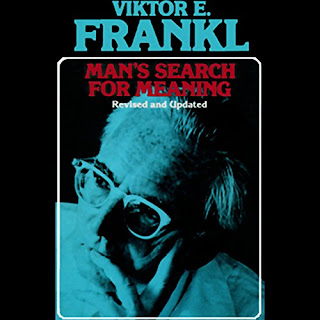For a good number of years, while being aware of Victor Frankl's book, I've been avoiding taking it up, in the (mistaken, as it turns our) belief that it's another one of those preachy 'self help' books full of homilies for the troubled mind, while being disjointed from realities. Coming to know that it was by someone who survived the Nazi camps stirred some interest, but not enough to motivate me to actually read it. Must say the loss has been entirely mine! Getting on Audible finally led me to this gem of a (audio)book.
In my view, the unique thing about this book is that it's not based on an author's observations of others traits and behaviors, but in large part on his own life spent inside the infamous Auschwitz concentration camp, while undergoing all the travails and tortures of that life but also retaining the sanity to be an 'observer' of his own psyche and that of his co-sufferers. The second fascinating fact (perhaps one that enabled Frankl to add to his uncompleted manuscipt while at the camp) is that he was a trained psychologist, who rose to even greater heights post his tragic incarceration, pioneered a whole new discipline (Logotheraphy, a summary of which is given in Part II of the book), and wrote a number of books.
Part I of the book, which is entirely based on Frankl's experiences at the camp, is quite a moving account. Besides alluding to the death (nee, murder by Nazis) of his wife who entered the camp with him, he gives a first person account of the minutiae of what went on at the camp on a day-to-day basis. The food deprivation, the overworking in trying conditions, the forced marches amidst freezing cold and snow, the swollen feet and emaciated bodies, the diseases and deaths in thousands, the incinerators with chimneys, references to the cannibalism which broke out in the camp towards the end - everything is brought out in full detail, albeit with compassion.
Frankl doesn't flinch from bringing out the 'deals with devil' by certain co-prisoners, warders and others, who inflicted or facilitated further tortures on others just to gain temporary respite from tortures and a few 'luxuries' like cigarettes. Amazingly, Frankl demonstrates a clear eye and unbiased attitude even while explaining the psyche of the prison guards, many of whom, as he says, were probably traumatized and inured to human emotions by being exposed continually to the barbaric goings on at the camp.
But also brought out is the potential for redemption, for a man (Frankl was placed in the male part of the camp) to rise above the circumstances and both demonstrate compassion towards others and help them in any way possible, by sharing one's own sparse food, by words and actions, by (in Frankl's case specifically) by volunteering to help in the ward of sick prisoners, which came with a real risk of infection and death.
Through it all, Frankl continues to weave his own take on existential questions concerned with the meaning of life. One of the themes he propounds is that it's not what is the meaning of life, but what meaning we can impart to life. At another point, he muses whether enduring the travails of life, while preserving one's dignity and humanity, is itself the point of life. (In this, he's perhaps close to the 'Karma' concept of Indian philosophy.) He tells of how some prisoners, many of them motivated by Frankl himself, learned to avoid giving up on life by thinking about who or what is waiting for them after the end of war.
The book is full of such insights and life lessons, perhaps much of them taken up and popularized in later years. Part II of the book lays out a summary of the branch of psychology which Frankl pioneered - Logotherapy, seemingly more attuned to emphasizing the patient's own choices and responsibilities rather than following the set patterns of traditional psychology. Part II has some interesting tools and techniques, but a large part could probably be of interest mainly to psychologists, though laypersons may probably try out some of those with no harm.
A must read for those looking to understand human psyche and motivation a little better.










